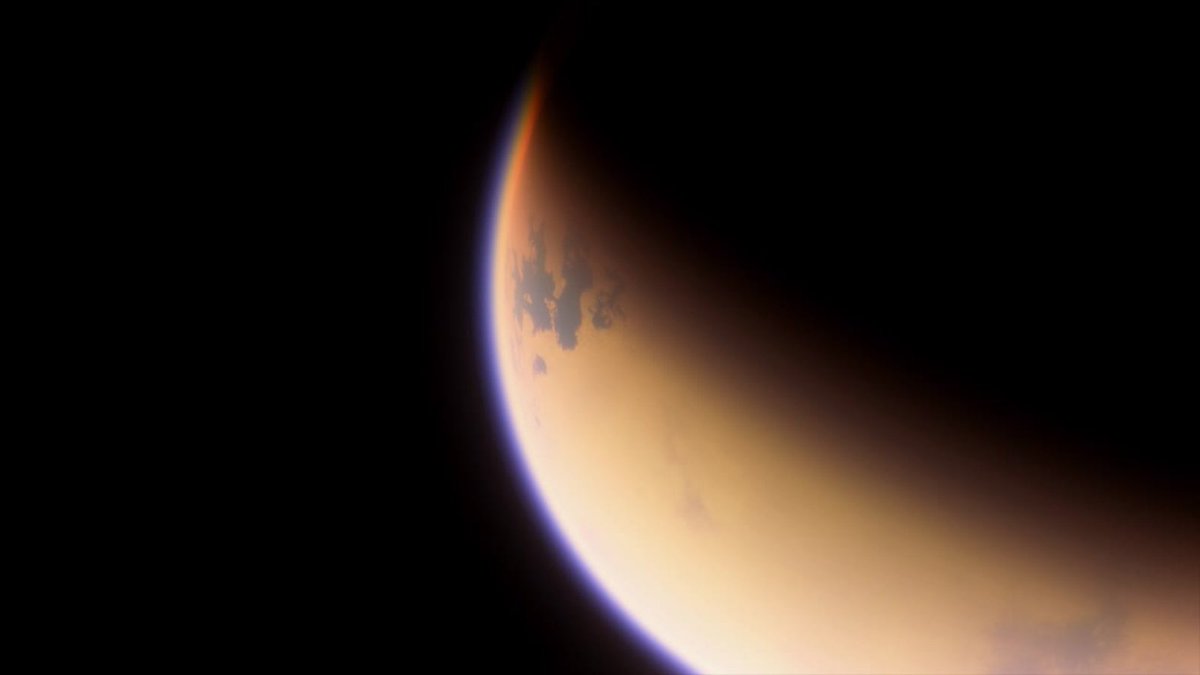In a first, @NASA flew a small helicopter - named Ingenuity - on Mars. Ingenuity performed the first powered, controlled flight on another planet. #MarsHelicopter
#DYK that rotorcraft flights are actually not a bad way to get around on other worlds?
#DYK that rotorcraft flights are actually not a bad way to get around on other worlds?
Saturn& #39;s moon Titan is the destination for #Dragonfly, the rotorcraft lander we’re designing at #JHUAPL. https://dragonfly.jhuapl.edu/
But">https://dragonfly.jhuapl.edu/">... no two atmospheres are exactly alike! The Martian atmosphere & the aerodynamics of the Mars helicopter are very different from Titan & Dragonfly.
But">https://dragonfly.jhuapl.edu/">... no two atmospheres are exactly alike! The Martian atmosphere & the aerodynamics of the Mars helicopter are very different from Titan & Dragonfly.
Titan& #39;s dense atmosphere (4x Earth& #39;s) and low gravity (1/7th Earth& #39;s) mean that flying is physically easier on Titan than on Earth (or Mars!). Yet flying is still one of the best ways to get around. Why? It& #39;s all about the physics (and the view).
Mars rover operators have to find a safe driving path for the vehicle. This means never driving farther than the rovers’ cameras can see ahead - usually no more than 100m per drive (about the length of an American football field), sometimes much less.
Flying, on the other hand, only requires that individual landing sites be safe enough for the vehicle to land and take off again. On Titan, Dragonfly will be able to scout ahead to identify safe and scientifically interesting landing sites. https://bit.ly/3wBtskA ">https://bit.ly/3wBtskA&q...
By using rotors instead of wheels, Dragonfly can also cover greater distances and visit different terrain types. Titan has a thick atmosphere that makes it possible for a vehicle with aerial capability - like Dragonfly - to fly. https://bit.ly/35oqjGr ">https://bit.ly/35oqjGr&q...
Titan’s thick atmosphere and low gravity allow Dragonfly to carry its science payload to Titan’s diverse environments, including an impact crater where liquid water and complex organic materials key to life once existed together, possibly for tens of thousands of years.
Dragonfly will carry a suite of scientific instruments to many locations on Titan. They will analyze molecules, measure chemical composition of the surface, detect Titanquakes and more.
Dragonfly also has "eyes"  https://abs.twimg.com/emoji/v2/... draggable="false" alt="👀" title="Augen" aria-label="Emoji: Augen">; a set of cameras to observe Titan’s terrain and help navigate and spot landing sites. On the ground, Dragonfly will collect surface material samples for analysis. https://bit.ly/3wBtskA ">https://bit.ly/3wBtskA&q...
https://abs.twimg.com/emoji/v2/... draggable="false" alt="👀" title="Augen" aria-label="Emoji: Augen">; a set of cameras to observe Titan’s terrain and help navigate and spot landing sites. On the ground, Dragonfly will collect surface material samples for analysis. https://bit.ly/3wBtskA ">https://bit.ly/3wBtskA&q...
The Martian atmosphere and the aerodynamics of the Mars helicopter are very different from Titan and #Dragonfly. We can learn a lot from the operation of Ingenuity on Mars. The Dragonfly team looks forward to working with the #MarsHelicopter team!  https://abs.twimg.com/emoji/v2/... draggable="false" alt="🚁" title="Hubschrauber" aria-label="Emoji: Hubschrauber">
https://abs.twimg.com/emoji/v2/... draggable="false" alt="🚁" title="Hubschrauber" aria-label="Emoji: Hubschrauber">
https://dragonfly.jhuapl.edu/ ">https://dragonfly.jhuapl.edu/">...
https://dragonfly.jhuapl.edu/ ">https://dragonfly.jhuapl.edu/">...

 Read on Twitter
Read on Twitter


 ; a set of cameras to observe Titan’s terrain and help navigate and spot landing sites. On the ground, Dragonfly will collect surface material samples for analysis. https://bit.ly/3wBtskA&q..." title="Dragonfly also has "eyes" https://abs.twimg.com/emoji/v2/... draggable="false" alt="👀" title="Augen" aria-label="Emoji: Augen">; a set of cameras to observe Titan’s terrain and help navigate and spot landing sites. On the ground, Dragonfly will collect surface material samples for analysis. https://bit.ly/3wBtskA&q..." class="img-responsive" style="max-width:100%;"/>
; a set of cameras to observe Titan’s terrain and help navigate and spot landing sites. On the ground, Dragonfly will collect surface material samples for analysis. https://bit.ly/3wBtskA&q..." title="Dragonfly also has "eyes" https://abs.twimg.com/emoji/v2/... draggable="false" alt="👀" title="Augen" aria-label="Emoji: Augen">; a set of cameras to observe Titan’s terrain and help navigate and spot landing sites. On the ground, Dragonfly will collect surface material samples for analysis. https://bit.ly/3wBtskA&q..." class="img-responsive" style="max-width:100%;"/>


